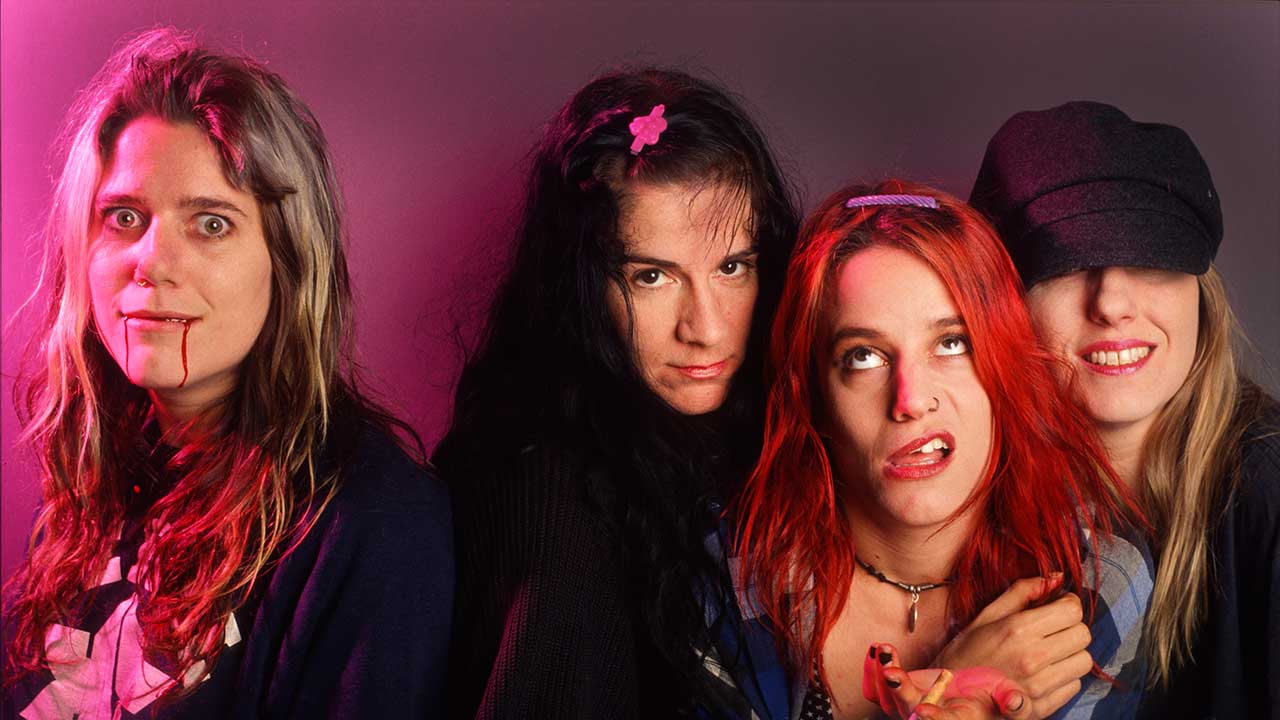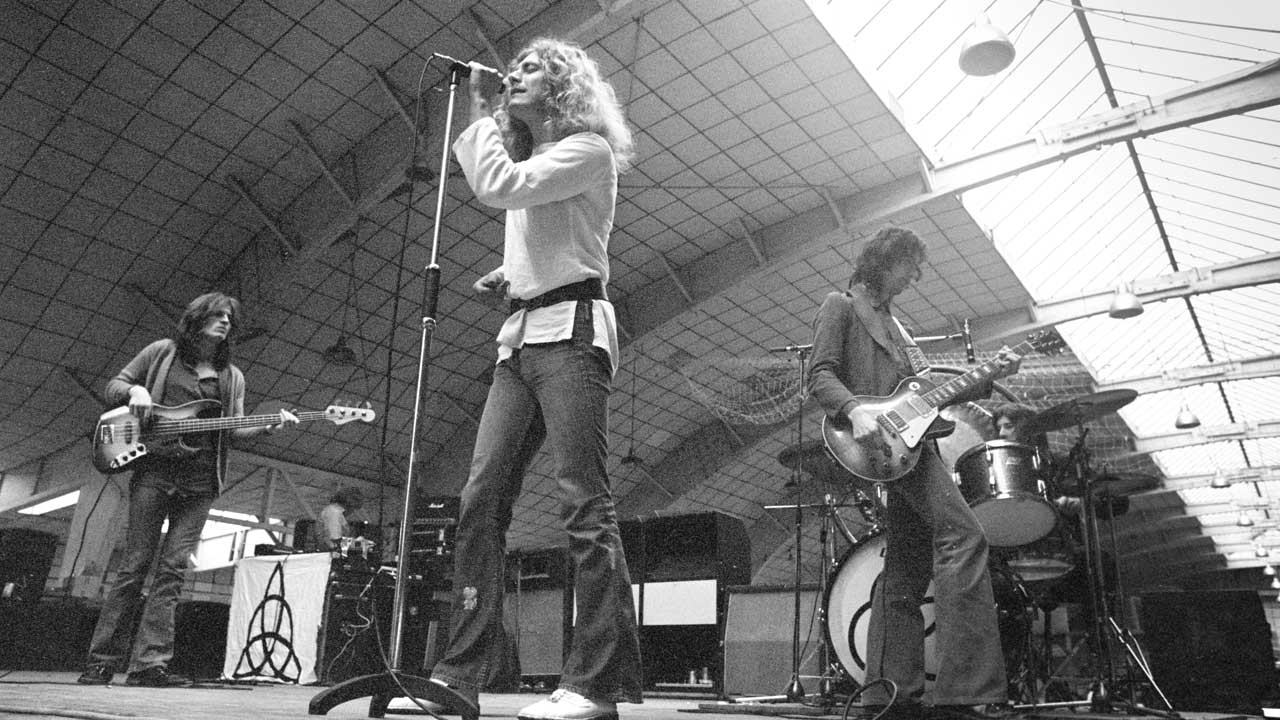Confrontation, chaos, and the turbulent tale of L7
Punk rock renegades who burst onto the Sunset Strip as grunge dawned, L7 burned brightly, released an all-time classic, and created headlines wherever they went

Select the newsletters you’d like to receive. Then, add your email to sign up.
You are now subscribed
Your newsletter sign-up was successful
Want to add more newsletters?

Every Friday
Louder
Louder’s weekly newsletter is jam-packed with the team’s personal highlights from the last seven days, including features, breaking news, reviews and tons of juicy exclusives from the world of alternative music.

Every Friday
Classic Rock
The Classic Rock newsletter is an essential read for the discerning rock fan. Every week we bring you the news, reviews and the very best features and interviews from our extensive archive. Written by rock fans for rock fans.

Every Friday
Metal Hammer
For the last four decades Metal Hammer has been the world’s greatest metal magazine. Created by metalheads for metalheads, ‘Hammer takes you behind the scenes, closer to the action, and nearer to the bands that you love the most.

Every Friday
Prog
The Prog newsletter brings you the very best of Prog Magazine and our website, every Friday. We'll deliver you the very latest news from the Prog universe, informative features and archive material from Prog’s impressive vault.
Most grunge-era bands have been credited with a role in the demise of hair metal. But few played their part with such panache, razor-sharp humour, wild hedonism and headline-grabbing performances as L7. And they did it all by infiltrating the very heart of the Sunset Strip.
Formed in Los Angeles by vocalist/guitarists Donita Sparks and Suzi Gardner in 1985, the band were unlike anything the city had seen before. A bunch of punk rock women playing metal, and coming from a musical standpoint that was more Motorhead than Poison, they quickly became known for their wild, raw live shows, uncompromising attitude and deeply sarcastic sense of fun.
Archly dishevelled, they looked like they’d been sleeping in their clothes for a week, while any make-up they used was turned into an art statement: lipstick was smeared on to preposterous, Leigh Bowery-style amounts, eyes were ringed with a racoon mask of red. Unexpectedly, the old guard – Guns N’ Roses, Faster Pussycat – lapped it up.
“There were bands that dug us and were waiting for chicks to come out there and hit them over the head with a frying pan, you know?” says Sparks, her voice friendly, no-nonsense and dripping with wit. “I think one of grunge’s greatest legacies is the temporary slaying of misogyny in rock.”
A new box set, Wargasm: The Slash Years 1992-1997, captures the band’s spectacular rise and messy fall. The band had already released a couple of albums on super-indie Sub Pop before signing to Slash. The label appealed to their art-punk sensibilities, having been home to The Germs and X, plus their headquarters were opposite the band’s favourite MexicanAmerican restaurant.
With the might of Slash’s parent company London Records behind them, they looked on bemused as their first album for their new label, 1992 album Bricks Are Heavy, and particularly its lead single Pretend We’re Dead – a rock club classic to this day – hit the mainstream pop charts. “We were just, like, sluggin’ it out in the underground in LA for many years,” says Sparks. “By the time it hit, it was just like: ‘About fucking time.’ We had peers that were getting signed and stuff too. So it felt like we were sort of pranksters from the underground. The underdog band.”
They certainly used their wicked sense of fun to get serious points across. Their reaction to sexual harassment from a promoter at one of their shows was to all pee in his hat. While working in the same studio complex as Motley Crue, Tommy Lee invited them in to hang out, and they were met with the sight of a room plastered with centrefolds. When they returned the invitation, they made sure their own base was covered from wall to wall with male pornography. “There were just penises everywhere,” Sparks says with a laugh.
Sign up below to get the latest from Classic Rock, plus exclusive special offers, direct to your inbox!
For UK audiences, the most in-your face moment that got L7 the country’s attention was an appearance on Channel 4’s The Word, a post-pub live TV show with a noisy mix of ramshackle interviews, gross-out stunts and live music. On the day of their recording, the agenda included a bare-bum competition, and a secret recording of guest Oliver Reed, drunk in his dressing room. As they soundtracked the show’s finale with Pretend We’re Dead, an agitated Sparks dropped her trousers and gave the nation a full-frontal eyeful.
“That was a really long day,” she remembers. “The other artists on the show were cool, but I thought it was a bit mean-spirited that they had a hidden camera in Oliver Reed’s dressing room. I don’t know, parts of the show seemed slightly mean spirited and I wanted to, um, fuck shit up.”
Rebellion has always been in Sparks’s nature. Born into a liberal household in a very conservative, middle-class, “horrible suburb of Chicago”, she was taught from a young age to question authority and stand up against injustice.
“I’m the youngest of four,” she says. “My oldest sister listened to Roxy Music and would come home dressed really wild, and the whole block would look at her. Every sister after that was always into the next wild look and getting bitch stares from the neighbourhood.”
For Sparks, it was punk rock that stole her heart and made her choose to be an outsider. She loved The Ramones and the Sex Pistols, The B52s and Ian Dury & The Blockheads, but most of all Poly Styrene and X-Ray Spex. With no real punk scene in Chicago at the time, as soon as she finished high school she packed her things and moved to California, where she landed a job at listings paper LA Weekly and did performance art in her spare time.
Suzi Gardner, a poet, had been in the role before her. The two were introduced by mutual friends.
“Suzi was always either getting fired or quitting jobs, and I was always taking her place,” Sparks remembers. “We were both in other bands that we didn’t like very much. On a drunken weekend she played me some stuff she was working on, and I was like: ‘Yes, this is what I wanna do!’ So we joined forces.”
Countless line-up changes followed, but it all came together when they found LA native Jennifer Finch to play bass and drummer Dee Plakas.
“Jennifer brought a career drive,” says Sparks. She was really a hustler, calling people and making shit happen. And Dee is a very incredible, solid drummer, and that’s what we were missing for all those years without her.”
By 1992, L7’s star was in the ascent. Pretend We’re Dead was on heavy rotation on radio and MTV (the making of the video was, in true L7 fashion, a messy affair that ended in a trip to the hospital for Gardner after a crane fell on her head), and by the summer the band were back in the UK to play at the Reading Festival for what should have been a triumphant celebration of having made it.
It wasn’t to be though. The weather turned against them, as did their on-stage sound. The audience, soaked through, freezing cold and impatient with the technical hold-up, made their dissatisfaction known by pelting the band with mud. Sparks responded with one of the most inventively aggressive moments in the festival’s history, by pulling out her bloody tampon and throwing it into the crowd.
“Reading was bittersweet because it was a show we were really looking forward to, and it was kind of like a coming out thing where you’ve made it,” she says. “It’s kind of like a debutante ball or something. It was a rainy, cold day and we got pelted with mud the whole time. It had thrown out our tuning, and we just had shit sound on stage.
"It was just not fun, and it was like a slow-motion gig. Also, we thought that it would catapult us further, but it was actually like the beginning of the levelling off of our career. So I went performance art, with a little bit of humour. And a little bit of politics, I suppose."
The follow-up to Bricks Are Heavy, Hungry For Stink, arrived in 1994. It was an altogether darker, heavier album. By this point the grunge landscape had changed. Their friend Kurt Cobain had died, pop-punk was on the rise thanks to Green Day, and the musical appetite of the public was starting to change. For L7, life on the road was a blur of drugs and booze, as captured in the recent, typically frank documentary Pretend We’re Dead.
“Hungry For Stink is darker. I think I was in a bit of a mood at that point,” says Sparks. “I was just in a dark place. That is reflected in songs like Baggage and My Sanity. It’s not a super-joyous album. We’ve always been a band that’s had shit going down even when things are on the upswing. We were dealing with being impoverished and also paying our rent and having jobs. We weren’t like college kids, we had bills to pay and we had drugs to do, and there was a lot going on."
Things unravelled further the following year, when their roadie and friend Umbar died on their tour bus; album sales had plateaued; and when they went to the studio to make 1997’s The Beauty Process: Triple Platinum, the rug was pulled out from under them further when Jennifer Finch quit via a letter in the middle of the recording.
In the film, she cites health and money issues, as well as grieving her father and Umbar, but a lack of communication between the four band members left a sour taste. And now there was a rush to find a new bassist who could match Finch’s renowned on-stage energy.
“It’s weird, because we never knew,” says Sparks. “We knew that she had another band that was pulling her away, and I think she maybe wanted to be a frontperson. But then in the documentary she attributes a lot of it to the passing of her father and some other personal things that were going on with her. So I think it was probably a bit of both. The timing was not great. And it wasn’t a discussion with us, it was just a piece of paper. It wasn’t nasty or anything, it wished us well, but it was a little odd. But I didn’t take it personally.”
Gail Greenwood from Belly stepped in, but the writing was on the wall for their time with Slash, and they were dropped from the label. Sparks, Gardner and Plakas went on to release one more album, Slap-Happy, as a trio through their own label, but that too was fraught with difficulties. The documentary reveals that the distributor folded and offered to sell the CDs back to the band, but as they were unable to afford the shipping most of them went into landfill. In a panic over her financial situation (“I thought I’d fucked up my life,” she says in the film), Gardner quit the band with a phone call. Sparks, having lost her creative partner, called an end to L7.
“It was difficult because of the way it went down, but once again if we had all talked and came to that conclusion it would have been good,” she says. “But it was more contentious than that. That contention hung over all of us for years. In what way was it contentious? That’s a private matter for now.
"Listen, everybody has their reasons for leaving the band. Suzi left the band and I did not want to replace Suzi and go on without her. And it’s not like we were burning up the charts or selling a lot of tickets to our shows either, it was a long, brutal decline and a not-good ending. So it left a really bitter taste in mine and Dee’s mouth for quite a long time. Everybody felt shitty.”
It was a sad and unusually quiet end for a band that had burned so brightly, and there was a danger of them fading into obscurity. But it was work on the documentary that got the four of them talking again after years of silence, and in 2015 they reunited for a new album, Scatter The Rats, and shows that were every bit as wild and electrifying as the ones that typified their early days. Now they’re planning more live shows for after the pandemic, as well as collaborations with other bands, having rediscovered the joy of performance.
“It’s not like we’re rolling in the dough,” says Sparks. “A lot of bands reunited and made a lot of money. Not us, of course, because that’s the L7 way. We are doing it because we enjoy it. Hopefully we’ll enjoy it for a long time.”
The return of L7 – feminist icons, punk-rock warriors and grunge-era heroes – is a reminder of how powerful rock’n’roll can be when it’s placed in the hands of the truly fearless. With communication back on the table, and no pressure to do anything more than go out and have fun on stage, these true underdogs, pranksters from the underground, live to fight another day.
“We realise now that we’re all different personality types – introverts, extroverts,” says Sparks. “I think we’re all a little bit older, a little bit wiser, and that’s the way it should be.”
Wargasm: The Slash Years 1992-1997 is out now via Cherry Red.
Emma has been writing about music for 25 years, and is a regular contributor to Classic Rock, Metal Hammer, Prog and Louder. During that time her words have also appeared in publications including Kerrang!, Melody Maker, Select, The Blues Magazine and many more. She is also a professional pedant and grammar nerd and has worked as a copy editor on everything from film titles through to high-end property magazines. In her spare time, when not at gigs, you’ll find her at her local stables hanging out with a bunch of extremely characterful horses.

